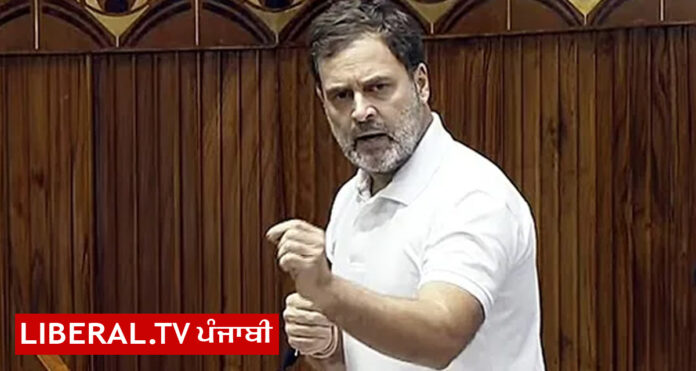In a sharp and scathing critique in the Lok Sabha, Congress leader Rahul Gandhi tore into the Modi government on issues ranging from national security to economic self-reliance, accusing it of failing to address fundamental challenges that threaten India’s future. His remarks, delivered during the debate on the Motion of Thanks to the President’s address on January 31, pinpointed the government’s inability to deliver on key promises, especially the much-touted Make in India initiative, and warned of serious consequences for the country’s defence preparedness.
Gandhi’s statement that “China is inside our territory” drew attention to the ongoing border tensions, citing the failure of the Make in India initiative as a key factor. In his view, the country’s inability to produce its own critical components—ranging from batteries to military optics—has left India vulnerable, especially in the context of a potential conflict with China. The Congress leader’s claim that India’s armed forces could soon rely on Chinese-made technology, even in a war, underscores his growing alarm about the country’s dwindling industrial base and strategic autonomy. He bluntly asked: “If and when we fight a war with China, we will be fighting with Chinese electric motors, Chinese batteries and Chinese optics.” In an era where self-reliance in defence manufacturing is paramount, this statement highlights the risks of dependence on foreign imports, particularly from a strategic rival.
In tandem with his criticism of the government’s economic failures, Gandhi also emphasized the need for a renewed partnership with the United States. He suggested that India’s growing industrial and technological capabilities were not just a matter of national pride, but a critical asset in shaping global economic and military dynamics. “India is as important as the US,” he argued, proposing that collaboration with the United States could help India build a robust industrial base that could rival China’s dominance in manufacturing.
Yet, Gandhi’s remarks weren’t limited to just defence and foreign policy. He also took a sharp jab at Prime Minister Narendra Modi’s leadership, claiming that the Make in India initiative—a flagship project aimed at boosting domestic manufacturing—had ultimately faltered. The Prime Minister, who was present in the House during Gandhi’s speech, faced the brunt of this criticism. Gandhi described the initiative as a noble idea that had been “pretty much failed” under Modi’s leadership, a stark contrast to the lofty promises made when the campaign was launched. The Congress leader’s statement struck a chord with many, reflecting a deep frustration over the continued stagnation in manufacturing, job creation, and employment opportunities for India’s youth.
Indeed, Rahul Gandhi did not stop at foreign policy or defence. He pointed out the government’s inability to tackle India’s deepening unemployment crisis, a subject that remains a perennial concern for millions of job-seekers in the country. Both under the Congress-led UPA and the current NDA government, he claimed, there has been no clear answer to the youth of India regarding employment. This criticism is not new, but it carries renewed weight as the government struggles to address one of the nation’s most pressing socio-economic issues.
Perhaps the most cutting remark of the day was Gandhi’s reference to the President’s address itself, which he described as little more than a rehash of last year’s speech—a “laundry list” of government achievements with no real substance. His description of the address as “pretty much the same” as last year’s may resonate with many citizens who feel that government promises rarely translate into tangible outcomes.
On the other hand, the government’s response was predictable. Parliamentary Affairs Minister Kiren Rijiju, speaking in defense of the government’s record, urged Gandhi to provide more substantiated claims on foreign policy and security issues. Rijiju’s remarks highlight the continuing political divide, where each side has its own narrative on the nation’s direction and priorities.
However, Gandhi’s concerns on India’s strategic security and economic future cannot be dismissed lightly. While the government has made strides in some areas, such as the digital economy and infrastructure development, the core challenges—national security vulnerabilities, economic self-sufficiency, and unemployment—remain unaddressed. Whether the government will take these critiques to heart and move toward a more self-reliant, forward-thinking approach to policy-making is yet to be seen.
At a time when the world is increasingly shifting toward geopolitical and economic self-sufficiency, India finds itself at a crossroads. Rahul Gandhi’s sharp critique is an attempt to shine a spotlight on the structural weaknesses in India’s approach, urging the government to step up its efforts before it’s too late. The question remains: will the government heed these concerns, or continue down a path of rhetorical victories with little substantial change? Only time will tell.



